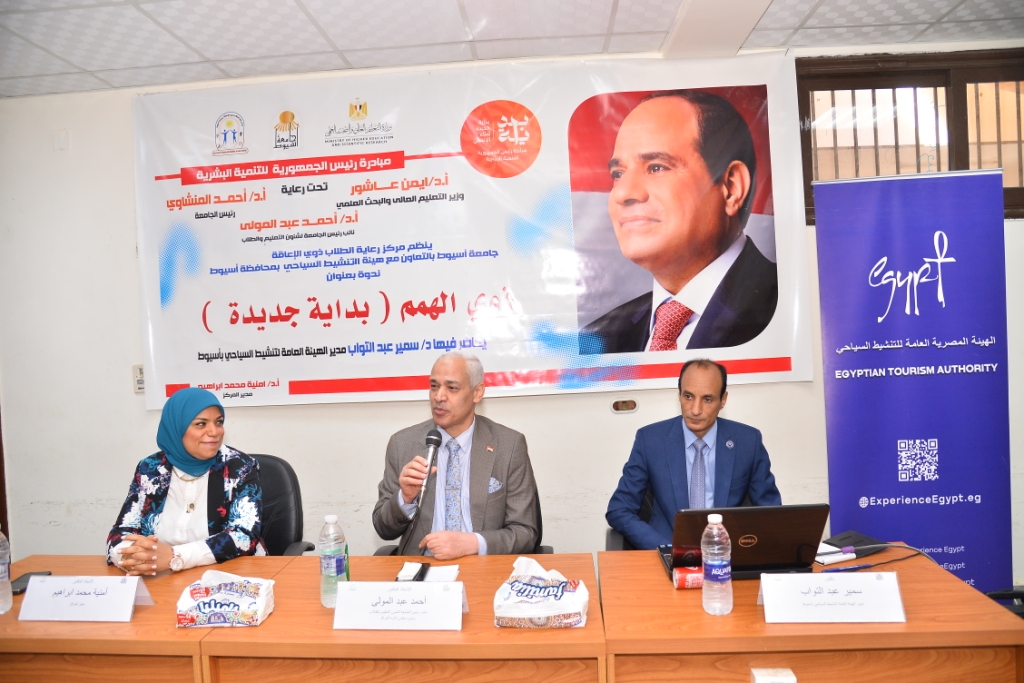Within the framework of the presidential initiative "A new beginning for building the Egyptian human":
The Center for the Care of Students with Disabilities at Assiut University holds a symposium "People with Disabilities: A New Beginning" in cooperation with the Egyptian General Authority for Tourism Activation
Prof. El-Minshawy: We aim to promote and develop tourist awareness of archaeological and historical monuments in Assiut Governorate and introduce Egyptian civilization
Within the framework of the presidential initiative "A New Beginning for the building of the Egyptian Man", which is carried out under the supervision of His Excellency President Abdel Fattah al-Sisi, the Center for the Care of Students with Disabilities at Assiut University, under the supervision of Prof. Ahmed El-Minshawy, President of Assiut University, today, organized a seminar entitled "People with Disabilities: A New Beginning", in cooperation with the Egyptian General Authority for Tourism Revitalization, within the framework of the initiative of the President of the Republic for Human Development "Baydaya", under the patronage of Dr. Ayman Ashour, Minister of Higher Education and Scientific Research.
The symposium was held under the supervision and presence of prof. Ahmed Abdel Mawala, Vice President for Education and Student Affairs, Dr. Omnia Abdel Qawi, Director of the Center, and Mr. Gharib Khairy Zaki, Director of the General Directorate of Public Relations and Media at the University. Dr. Samir Abdul Tawab, Director of the Egyptian General Authority for Tourism Activation in Assiut, lectured on the participation of a number of employees of the university and the Authority, media professionals, and a large number of students with disabilities.
Prof. Ahmed El-Minshawy stressed that Assiut University is keen to participate in the "New Beginning" initiative, which aims to promote investment in human capital, through a complex work program aimed at human development and working to consolidate the Egyptian identity, strengthen the mechanisms of developing tourism and archaeological awareness among citizens and introduce them to the civilization and heritage of their country and the importance of tourism and its role in the development of society and activating internal tourism, in addition to consolidating the sense of belonging to them and being proud of the history and civilization of their country.
For his part, Prof. Ahmed Abdel Mawla pointed to the university administration's pride in students with determination, and its keenness to support them in various forms, as they are completely financially exempted from tuition expenses, university city fees, sports activities fees, etc. The university also supports them academically, and is keen to integrate them in various student activities and social events, which contributes to their success in their future working lives, pointing to the university's pride in the achievements of its people of determination in all fields.
Dr. Omnia Abdelkader praised the support of the university administration of the Center in its various activities, expressing her pride in starting the series of educational seminars at the university from the Center for the Care of Students with Disabilities. She thanked all those who participated in organizing the symposium, and pointed to the Center's keenness to integrate its students into various tourist, recreational and cultural activities, where he previously organized a trip to Alexandria in which 38 students of determination participated. In cooperation with the Egyptian Authority for Tourism Revitalization, a number of trips will be organized to learn about the archaeological and historical monuments in Assiut governorate and other Egyptian governorates.
During his lecture, Dr. Samir Abdel-Tawab reviewed the ancient Egyptian civilization and its dealings with people of determination in a civilized and sophisticated way. They reached the highest positions in ancient Egypt. Some of its most famous kings even suffered from some forms of disability, such as Queen Hatshepsut and King Tutankhamun. He also reviewed models of the most famous disabled in the modern era in Egypt and the world, including Dr. Taha Hussein, Dean of Arab literature, who was blind, and the scientist Helen Keller, who suffered from several disabilities. She was blind, deaf and mutty, stressing that any of those with determination can join the list of world's geniuses whose disabilities did not stand in the way of their success.
 Do you have any questions?
Do you have any questions? 





